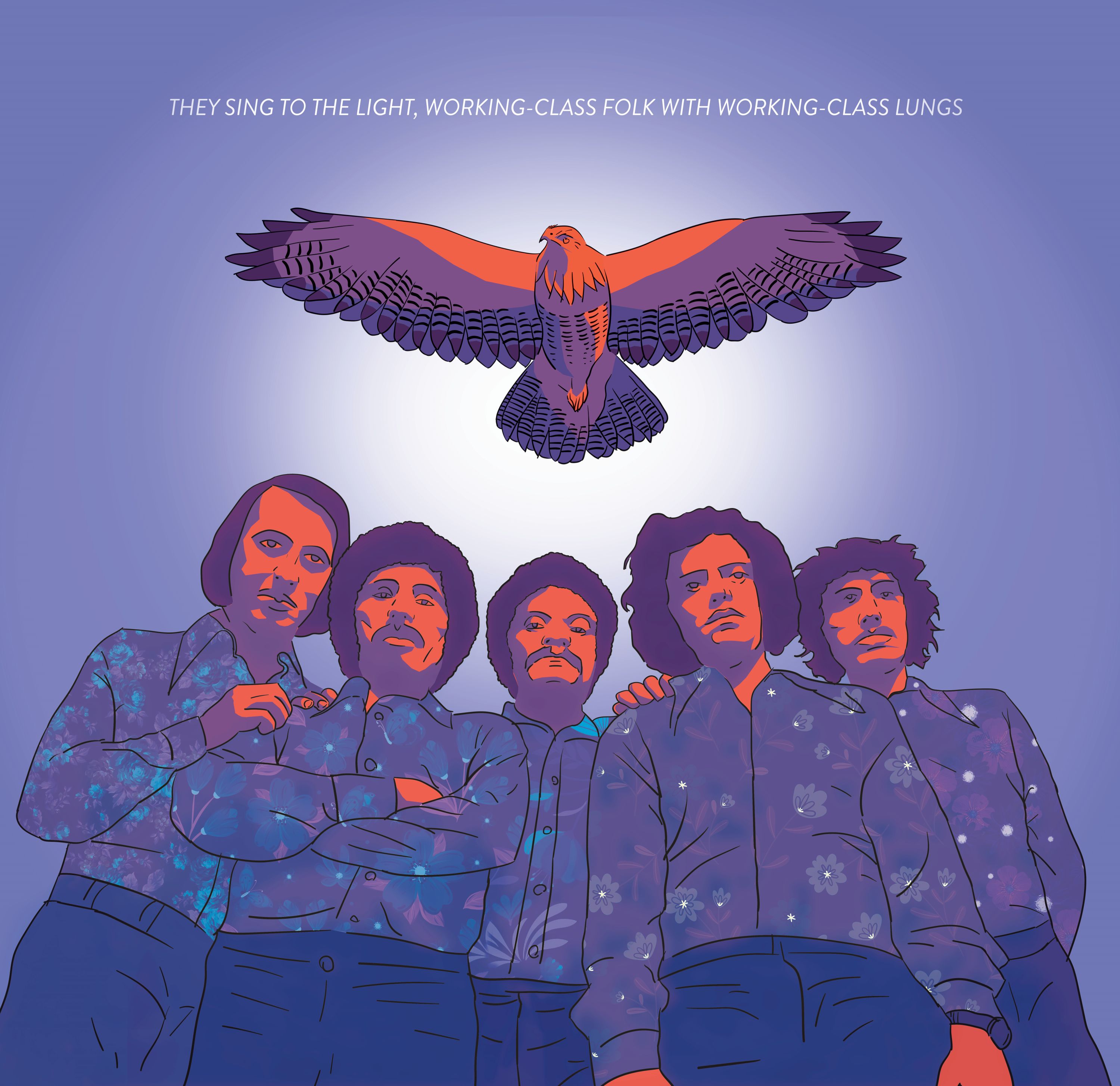
The Unending Trials of Finding a Better God
In this new episode of the column «Sonic Worlding», our writer depicts the Moroccan avant garde band Nass El Ghiwane as straying birds in search of a different life. A poetic sonic fiction.
At the concert, working-class folk rush, but collectively they look stagnant. The pressure of constant friction has put them in progressive stasis, orbiting a light. In the hadra of the Mouath’en, working-class women and working-class men extend their limbs in hopes of catching most of the light. They shuffle, working-class folk in working-class shoes, as the bendir thumps – outwards, and the sintir searches – inwards. The poet transcends in words:
«Oh you, who is hawk trapped in cages,
and you, whose wings spread on the perch.
Oh you, who is a saddlebag that offered its back,
for a thread to be sown.
I have never seen a herd of gazelles whipped into marching,
while the horses freely roam.»
The individual bird flies in intermittent connection with the flock, each living in its own spatial world within the formation. Sometimes interlocking, sometimes drifting, yet at all times, forming and molding the existence of the flock – which in the migration of birds, is God, the omnipresent. Together, they sing to the light, working-class folk with working-class lungs.
«Oh God, my only God. You are most knowing of my state.»
I can’t help but wonder, how is the God of the working-class doing?
«Where are those people of good intention once gathered around you?» L’Arbi Batma sings in his somber, sand-filled voice about the tribulations of parting. Batma along with Omar Sayyed (the Mouath’en), Boujemaa Hgour, and Allaal Y’aala traversed the world both as a disciple and as a dissident, the way a mystic would intermingle the realms of the mundane and the metaphysical. The four friends, who formed Nass El Ghiwane as a byproduct of their theatrical pursuit, were somewhat stray birds, from the working-class neighborhood of Hay Al Mohammedi in post-independence 1960s Casablanca.
«Somewhat» because although they were still in formation, they knew they had already strayed. «In other words, the world of our grandparents was disappearing – or had disappeared already and as much as we thought that we were on our way to something better, we had also lost something enormous.» Sayyed reflects.
«Scattered, Scattered… Oh Arabs, you are scattered» the collective voice echoes as the Mousalli rocks and swings, kneeling at one instance and spinning at the other, sintir wrapped around chest, of which he raises praise to god – Abderrahmane «El Maalem» Paco was one of the last to flock. He gained the title of Maalem «the Master» after he left his everlasting imprint on the group’s musical and spiritual invocations. It was after the cataclysmic passing of the band’s founding father Boujemaa Hgour that his transformational role truly crystallized.
The chorus-line hypothesis explains why the shift in flock formation happens in the form of a wave: an abrupt movement at the head ripples in amplified tides throughout the unending body, altering its shape, at times to obscure and bittered resemblance – onwards. In that instance, Paco and the group had mastered the song of the scattered birds; Paco spoke in the tongue of those who traveled by fate.
Decades later, in 2019, the younger brother and successor of the late L’Arbi Batma is seen greeting a homesick crowd in Amsterdam. The group had deformed and evolved with the tragedies of the modern world, which included the loss of Nass El Ghiwane’s founding fathers. Alles Gute, Rachid greets, as third and fourth-generation flocks vocalize in syncopated rhythms. Singing with the same uncertainty «Fen Ghadi Biya Khouya» – where are you taking me, brother? Affirming with the same warmth of L’Arbi’s early years, «I have not forgotten the seasons, nor the horses, not even a single one». Reaching out to capture most of the light. Reviving the old God, forming the new one.
«Sonic Worlding» is a monthly Norient column. It invites writers and artists from all over the world to to think and speculate with and not only about music. Where most music writing treats music as something that can be categorised and placed in pre-determined boxes (personality cults, end-of-year lists, genres, origins, styles), «Sonic Worlding» is interested in the vast potential of rhythms, ideas, and worlds that are still to be unlocked, attempting to spin new webs of thought spanning the globe. Edited & curated by Norient editor Philipp Rhensius.
Biography
Published on September 26, 2022
Last updated on July 06, 2023
Topics
About the micropolitical qualities of sound as a non-conscious experience of intensity.
A form of attachement beyond categories like home or nation but to people, feelings, or sounds across the globe.
From world known reggae musicians fighting against the devil to the black metal scene in Indonesia.
Special
Snap


